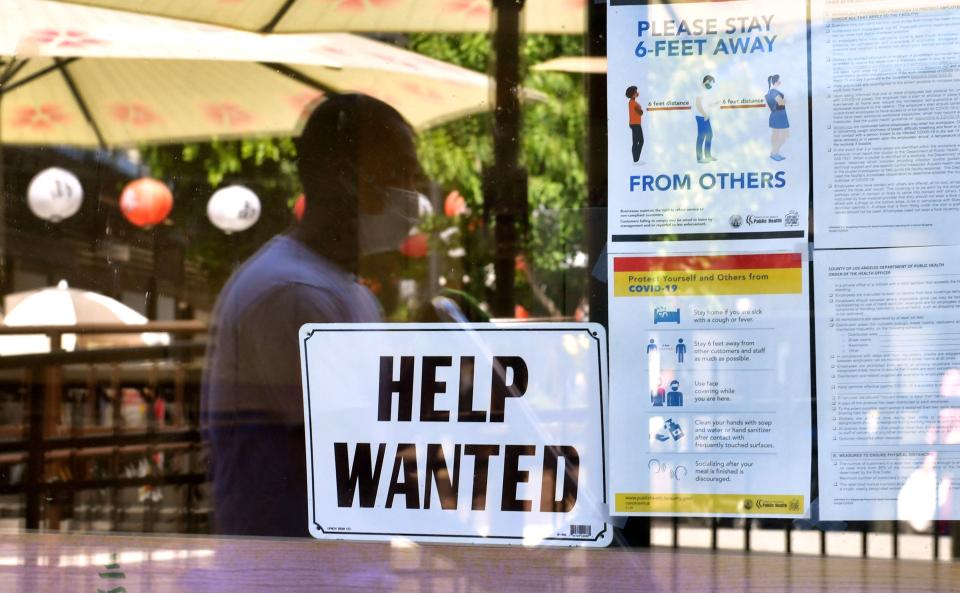In normal times, the prospect of minimum wage increases in states and cities around the country would bring a cascade of appreciation from worker advocates and a chorus of howls from employers.
These have clearly not been normal times.
The prospect of 21 states and 35 cities and counties raising their minimum wages on or around Jan. 1 doesn’t appear to be provoking much of a reaction. That might be because, at the current moment anyway, base labor rates don’t seem to matter much in many cities.
The pandemic and strong economy have given Americans a rare measure of leverage in choosing where to work – or whether to work at all. Many still choose to stay on the sidelines even as businesses, short of labor, raise wages.
“There are so many desperate for workers they are willing to pay above minimum wage,” said Bernard Baumohl, chief global economist for The Economic Outlook Group. “If there is any kind of priority, it is to retain their current workforce.”
So as governments boost minimum pay, many low-wage workers are already ahead of the boost.
►Where does your state rank?: Massachusetts tops 5 states with the worst worker shortages.
$15-an-hour closer to reality
The National Employment Law Project reported that in addition to the minimum-wage adjustments at the start of the year, further increases later in the year will raise pay in a total of 25 states and 56 localities.


Some states are hitting the $15-an-hour mark that President Biden has set as a national goal. Large employers in California will have to start paying it. Long Island and Westchester County will join New York City in requiring at least $15-an-hour in New York state.
Other states and locales are raising minimum wages, though they will still be shy of $15 an hour. Illinois will reset it at $12 an hour, up from $11. New Jersey will have a minimum wage of $13 an hour for most workers, also up a buck.
►The Great Resignation: As millions of jobs go unfilled, employers look to familiar faces in ‘boomerang employees’
Base wages still too low?
Some experts say even if they weren’t competing for workers, history indicates companies aren’t terribly hampered by wage increases.
“The evidence shows this is something that, on net, employers can absorb,” said Heidi Shierholz, an economist who is president of the Economic Policy Institute.
The impact of a higher minimum wage is at least partially offset by lower turnover and recruitment costs and higher worker morale, she said. Companies may whine, but a higher minimum wage hasn’t proven to be a big problem.
“There’s always this absolute crying out – ‘the sky is falling’ – and every time, it does not,” she said.
In fact, she says, even the boosted minimum wage is still too low in some cities.
Lost jobs, higher inflation
Even in the current economy, opponents can still point to many of the historic arguments against raising the minimum wage. Chief among them: A higher wage base further stokes inflation and costs jobs.
In analyzing a proposal before Congress to raise the minimum wage to $15 nationally by June 2025, the Congressional Budget Office found earlier this year that employment would be reduced by 1.4 million, or 0.9 percent of the nation’s labor force.
Some 17 million Americans hold jobs that pay below $15 an hour.
Relatively large increases in the minimum wage reduced employment rates among workers with low skill and education levels by 2.5 percentage points in the short- and medium-term, according to a study from the University of California, San Diego, and the American Enterprise Institute.
It’s yet to be seen whether companies will shed jobs rather than pay a higher minimum wage. At the moment, many need more in their ranks, not fewer, to meet surging customer demand.
►Inflation’s impact: Inflation surges to 39-year high. How much more are you paying and what’s the damage for Biden?
Help wanted signs abound
“If you want to draw customers and clients, you need to hire more people,” Baumohl said. “Some industries are going to have a hard time getting workers back in.” He cited the hospitality and restaurant sector in saying employees have taken advantage of the abundance of jobs to switch careers.
It’s going to take more than higher wages to retain workers, he said. Employers have had to offer signing bonuses, flexible work schedules and where they can, the opportunity to work remotely.
Such inducements could be effective.
Some 41 percent of the 2,400 professionals surveyed by recruiting firm Robert Half say they intend to look for a new job early next year, up from 32 percent in the last survey six months ago.
Top reasons: Higher pay, followed by perks and the chance to work remotely.
►The fight for workers: Employees can expect a nice raise next year as companies struggle to fill jobs
Contributing: Paul Davidson
This article originally appeared on USA TODAY: Will minimum wage increasing in these states, cities help fill jobs?